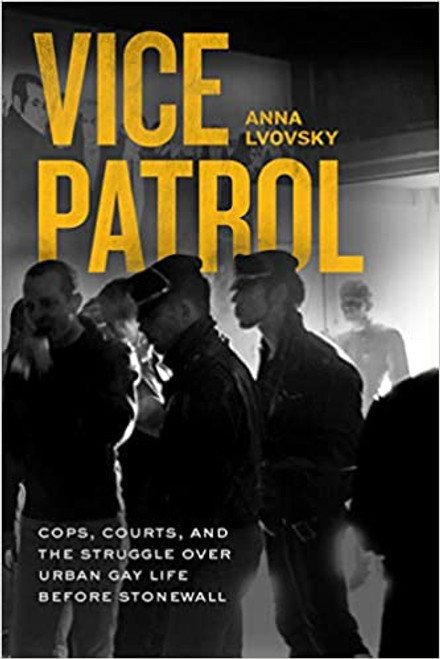In the mid-twentieth century, gay life flourished in American cities even as the state repression of queer communities reached its peak. Liquor investigators infiltrated and shut down gay-friendly bars. Plainclothes decoys enticed men in parks and clubs. Vice officers surveilled public bathrooms through peepholes and two-way mirrors.
In Vice Patrol, Anna Lvovsky chronicles this painful story, tracing the tactics used to criminalize, profile, and suppress gay life from the 1930s through the 1960s, and the surprising controversies those tactics often inspired in court. Lvovsky shows that the vice squads’ campaigns stood at the center of live debates about not only the law’s treatment of queer people, but also the limits of ethical policing, the authority of experts, and the nature of sexual difference itself—debates that had often unexpected effects on the gay community’s rights and freedoms. Examining those battles, Vice Patrol enriches understandings of the regulation of queer life in the twentieth century and disputes about police power that continue today.
Author: Anna Lvovsky
Paperback Published 18 June 2021 360 pages
“Lvovsky has done incredible detective work to take us deep inside the machinery of antigay policing during its peak years. Focusing on three distinct sites—the regulation of gay bars by state liquor agencies, the work of plainclothes decoys, and the policing of public restrooms through ‘peepholes’—Lvovsky shows that a legal system we assumed to be monolithically repressive was in fact internally divided about these practices. This subtle and smart book not only illuminates the boundaries around sexual difference but criminal justice as well. Revelatory in every sense of the word.”- Margot Canaday, Princeton University
"Lvovsky takes the vice patrolman—the villain who lurks at the edges of virtually every work of the queer communities that flourished in twentieth-century U.S. cities—and insistently pulls him into the spotlight. Vice Patrol is ambitious, meticulously researched, exceptionally well-conceived, and startlingly original. It deserves a wide readership among historians of law and legal history, LGBTQ history, urban history, and the history of policing and punishment. It is, in fact, a tour de force that will be read and reread by every scholar in the field and will lead us to ask new questions of our sources in the years to come."- Timothy Stewart-Winter, Rutgers University
